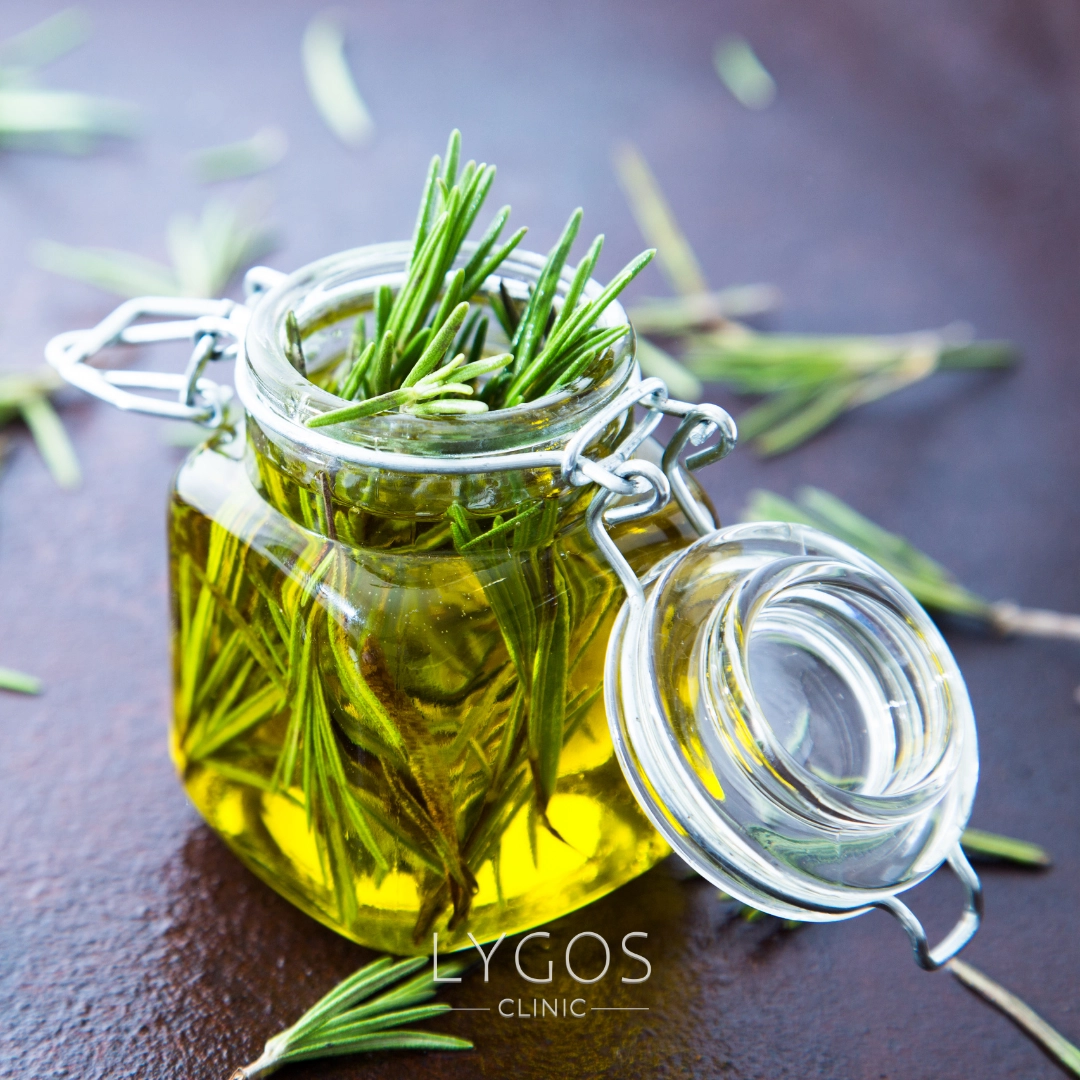Rosemary Oil for Hair Growth | Uses and Benefits | LYGS 2025

Rosemary Oil
Rosemary is one of the plants that can be utilized naturally. Rosemary, which belongs to the maquis species, the typical vegetation of the Mediterranean climate, can easily grow almost anywhere when it is well watered and receives plenty of sun. One of the most well-known forms of this plant, which has a wide variety of uses, is rosemary oil. Rosemary oil is especially known for its positive effects on hair and skin health. It also reduces stress, helps relieve pain and inflammation, so it is often preferred as a natural source of healing. In this article; What is rosemary oil? We will discuss what is curious about the benefits of rosemary oil.
What is Rosemary Oil?

Rosemary oil is a natural product obtained from the extract of the rosemary plant and has an important place among essential oils. This oil, which has antibacterial and antioxidant properties, offers numerous benefits to the body. It stands out especially with its nourishing effect on hair and skin health. Unlike rosemary extract, rosemary oil is applied topically or inhaled in aromatherapy. On the other hand, rosemary extracts can also be used as oral supplements.
The main benefits of rosemary oil are that it promotes hair strengthening and skin regeneration. It is also known for its pain-relieving effect, reduces stress, improves blood circulation and relieves inflammation of tissues and joints. Rosemary oil makes a difference not only with its healing effects but also with its intense and pleasant scent. While many herbal oils reduce the desire to use with unpleasant odors, rosemary oil is used with pleasure in many areas from colognes to skin care products thanks to its relaxing aroma.
What Does Rosemary Oil Do?

There are many areas where rosemary oil can be beneficial. Thanks to its rich antioxidant and anti-inflammatory content, it can strengthen the immune system and support blood circulation. Antioxidant substances help neutralize free radicals that are formed as a result of the body’s natural metabolic processes, thus preventing cell damage and maintaining overall health.
Besides this, other areas where rosemary oil can exert an effect are quite diverse. For example, it can help relieve indigestion problems, improve memory and concentration, support the nervous system by providing neurological protection, and play a protective role against macular degeneration. Thanks to these versatile properties, the question of what is rosemary oil good for becomes more meaningful.
What are the Benefits of Rosemary Oil?

Rosemary oil is known as a natural painkiller and offers many health benefits. It stands out especially with its positive effects on hair and skin health. It reduces hair loss, strengthens hair follicles and nourishes the skin deeply, giving it a more vibrant appearance. It is also very effective in reducing stress; it provides mental relaxation by reducing cortisol levels. It also optimizes blood flow in the body by accelerating blood circulation and helps reduce inflammation.
We can list the benefits of rosemary oil as follows:
- It acts as a natural painkiller.
- It is effective against hair loss.
- Supports and nourishes skin health.
- Provides mental relaxation by reducing stress.
- Accelerates blood circulation.
- It has a diuretic effect.
- Removes viruses, bacteria and blood-sucking insects.
- Improves brain function.
- Minimizes the effects of tissue and joint inflammation.
Rosemary oil is one of the natural health supporters thanks to these versatile properties.
What are the Benefits of Rosemary Oil for Hair?
Rosemary oil is an effective product that stands out with its benefits for hair. Rosemary oil is an effective natural solution against androgenetic alopecia, which is common in men and causes hair loss. This oil deeply nourishes the scalp, strengthens the hair follicles and reduces hair loss. Rosemary oil can also help hair grow faster and healthier. With regular use, it contributes to the revitalization of the hair strands and a fuller appearance with the nutrients it provides to the scalp. Thanks to these properties, rosemary oil offers a natural and effective support for those who experience hair loss.
What are the Side Effects of Rosemary Oil?

Although rosemary oil is generally considered safe when used in low doses, excessive and prolonged use can lead to some serious side effects. In particular, the use of rosemary oil in high doses can cause negative effects. The side effects of rosemary oil are as follows:
- Vomiting
- Muscle spasms
- Loss of consciousness (coma)
- Pulmonary edema (fluid accumulation in the lungs)
These side effects are due to the strong content of rosemary oil. In addition, pregnant women should avoid using rosemary oil or rosemary extract, as high doses of rosemary can cause miscarriage during pregnancy.
How to Use Rosemary Oil?

Before moving on to the rosemary oil obtained from the rosemary plant, it should be noted that this plant also provides many benefits in its dry form. Rosemary can be applied to the skin by making rosemary cologne or can be smelled to benefit from its relaxing effect. It can also be consumed orally as rosemary tea. Thus, it provides positive effects on the digestive system and general health.
The use of rosemary oil is quite diverse. Smelling the oil through inhalation can help you benefit from its expectorant, relaxing and attention-enhancing properties. It can also be used in various treatment methods such as massaging the skin, relieving muscle pain and increasing blood circulation. Rosemary oil is a natural source of healing with its versatile benefits in both inhalation and topical use.
How to Use Rosemary Oil for Hair?

When applying rosemary oil to hair, it is very important to pay attention to some basic steps in order to achieve healthy results and avoid possible irritation. So, how to use rosemary oil for hair?
1. Dilute with Carrier Oil: Rosemary oil can cause irritation when applied directly to the skin. Therefore, you should dilute it using a carrier oil such as olive oil, almond oil or grape seed oil. Prepare the mixture by adding 2-3 drops of rosemary oil into 1 teaspoon of carrier oil.
2. Prepare the Mixture: Mix the carrier oil and rosemary oil well. This allows the oil to penetrate more gently into your scalp and hair.
3. Do a Skin Test: Before using rosemary oil, always do a skin test to prevent allergic reactions. Apply the mixture to the inside of your wrist or elbow and observe for 24 hours. If you see any signs of redness or irritation, avoid using the oil.
4. Apply to the Scalp: If you are using rosemary oil for hair loss or hair growth, massage the mixture into your scalp. Gently massage in a circular motion with your fingertips to help the hair follicles absorb the benefits of the oil.
5. Apply to the Ends of the Hair: If your hair ends are dry and damaged, you can also apply the rosemary oil mixture to the ends. However, be more careful when applying it to the ends, because the ends of the hair can be sensitive.
6. Cover Your Hair: After applying the oil, wrap a shower cap or towel over your hair to allow the oil to penetrate your hair better.
7. Waiting Time: You can leave the oil on your hair for 30 minutes to a few hours. However, leaving it on for a long time can cause irritation, so it is important to pay attention to the recommended time.
8. Wash with Shampoo: After the waiting time is up, wash your hair with warm water and a suitable shampoo. This will help remove any oil residue left in your hair.
9. Regular Use: Regular use is important to see the full effects of rosemary oil. Applying it several times a week will help you achieve healthier and stronger hair in the long run.
With these simple but effective steps, you can get maximum benefit from the contributions of rosemary oil to your hair health.


